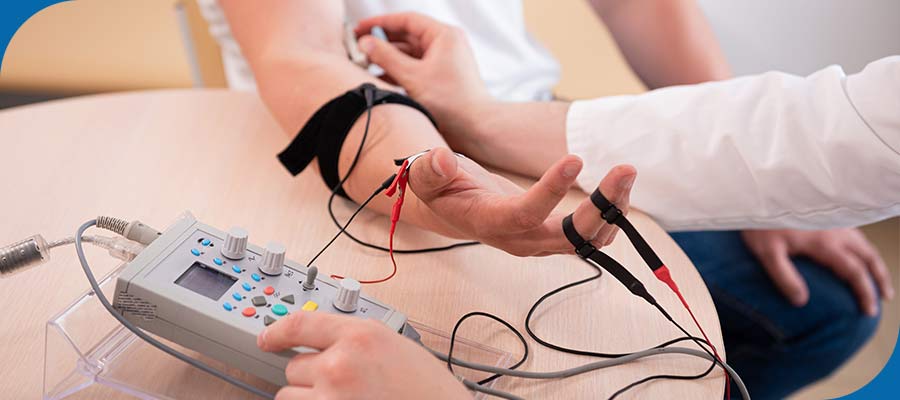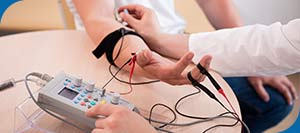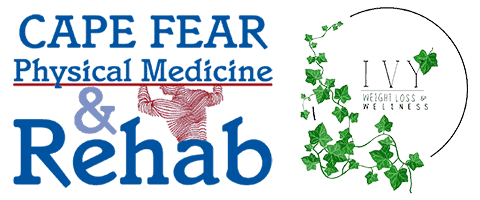How Much Does an EMG Cost?
An EMG (electromyography) test assesses the health of muscles and nerve cells that control them. It helps identify issues with nerve dysfunction and muscle problems. The cost typically ranges from $100 to $500, depending on factors like location and test complexity. Additional fees may apply, and insurance may reduce out-of-pocket costs. At Cape Fear Physical Medicine and Rehab, our professionals are ready to assist you with your diagnostic needs. Contact us today for more information or book an appointment online. We are conveniently located at 1540 Purdue Dr, Ste. 200 Fayetteville, NC 28303.


Table of Contents:
What is the average cost of an EMG test?
What is an EMG (electromyography)?
What can an EMG diagnose?
What do the results of an EMG test mean?
The average cost of an EMG test can vary based on several factors, including the specific clinic chosen and the extent of testing required. For instance, some patients may need only one limb tested, while others may require multiple limbs to be examined, with costs typically ranging from $100 to $500.
It’s important for patients to inquire about insurance coverage, as many insurance plans may cover EMG tests, especially when they are deemed medically necessary and referred by a healthcare provider. Patients at Cape Fear Physical Medicine and Rehab can find information about accepted insurance on the clinic’s website.
Additionally, while EMG can provide valuable diagnostic information, it may not be the only test required, further tests may increase the overall cost, which healthcare providers at Cape Fear will discuss with patients to ensure they understand their diagnostic plan and potential financial implications.
Electromyography (EMG) is a diagnostic test performed to evaluate and record the electrical activity produced by skeletal muscles. EMG falls under the category of electrodiagnostic testing and is used to assess the health and function of muscles as well as the nerves that control them.
During an EMG, small needles are inserted through the skin into the muscle, where they pick up electrical activity, which is then displayed on a monitor in the form of waves.
This activity can also be heard through an audio amplifier, allowing the physician to analyze the muscle’s response to nerve stimulation during different stages, including rest and various levels of contraction.
The test helps healthcare providers understand the communication and responses between the central nervous system, nerves, and muscles that occur during every bodily movement.
An EMG can identify issues with motor nerves or the muscles themselves and how they communicate with each other. EMG testing may be ordered by providers at Cape Fear Physical Medicine and Rehab to identify, diagnose, or rule out, a variety of neuromuscular abnormalities alongside various injuries and conditions affecting the skeletal muscles.
EMG is used to diagnose a wide range of illnesses and diseases affecting the muscles or motor nerves and can determine the location, presence, and extent of these issues. It is particularly useful in identifying muscle disorders such as muscular dystrophy, dermatomyositis, and polymyositis.
Additionally, EMG can detect problems affecting peripheral nerves, including nerve compression syndromes like carpal tunnel syndrome and peripheral neuropathy. The test is also effective in diagnosing conditions affecting motor neurons in the spinal cord or brain, as well as issues involving the nerve roots, such as sciatica or pinched nerves.
EMGs can be utilized in the diagnosis of conditions impacting the neuromuscular joints as well. EMGs may be used to make or confirm a diagnosis or may be ordered alongside other testing to help pinpoint the root cause of any number of neuromuscular issues.
The results of an EMG test provide various information concerning nerve and muscle function, particularly regarding the transmission of signals from nerves to muscles.
These results can confirm or rule out a number of conditions related to nerve dysfunction, muscle dysfunction, and issues with nerve-to-muscle signal transmission.
EMG results are instrumental in diagnosing or confirming suspicions of muscle or nerve disorders, which may present symptoms such as numbness, tingling, muscle pain or cramping, muscle weakness, and certain types of limb pain.
Once the test is completed, a neurologist will interpret the data and prepare a detailed report discussing the necessary follow-up steps, including potential treatment options if a diagnosis is made.
EMG tests must be considered by specialists in the context of an individual’s broader health factors and the results are interpreted alongside these considerations in forming a diagnosis.
At Cape Fear Physical Medicine and Rehab, we are dedicated to supporting your weight loss journey with personalized care and effective treatments. Our professional team ensures that you receive the right guidance and resources to help you achieve your goals safely. Contact us or schedule an appointment to discover how Mounjaro and our comprehensive approach can make a difference in your weight loss success. We are conveniently located at 1540 Purdue Dr, Ste. 200 Fayetteville, NC 28303. We serve patients from Fayetteville NC, Woodfield NC, Hope Mills NC, Fort Bragg NC, Eastover NC, and surrounding areas.

Check Out Our 5 Star Reviews


Additional Services You May Like
▸ Weight Loss & Wellness Program
▸ Botox for Migraine
▸ EMG Nerve Conduction Studies
▸ Epidural Steroid Injections
▸ Radiofrequency Ablation
▸ Rehabilitation Consultations
▸ Facet Injections
▸ Sacroiliac Joint Injections
▸ Joint Injections
▸ Genicular Nerve Blocks
▸ Prosthetic Evaluation/Management
▸ Adjuvant Therapy/Care
▸ Spasticity Management
▸ Stroke Treatment
▸ Multiple Sclerosis
▸ Spinal Cord Injury
▸ Traumatic Brain Injury
▸ Lifestyle Medicine
▸ Phentermine
▸ Qsymia
▸ Contrave

Additional Services You May Like
▸ Weight Loss & Wellness Program
▸ Botox for Migraine
▸ EMG Nerve Conduction Studies
▸ Epidural Steroid Injections
▸ Radiofrequency Ablation
▸ Rehabilitation Consultations
▸ Facet Injections
▸ Sacroiliac Joint Injections
▸ Joint Injections
▸ Genicular Nerve Blocks
▸ Prosthetic Evaluation/Management
▸ Adjuvant Therapy/Care
▸ Spasticity Management
▸ Stroke Treatment
▸ Multiple Sclerosis
▸ Spinal Cord Injury
▸ Traumatic Brain Injury
▸ Lifestyle Medicine
▸ Phentermine
▸ Qsymia
▸ Contrave







